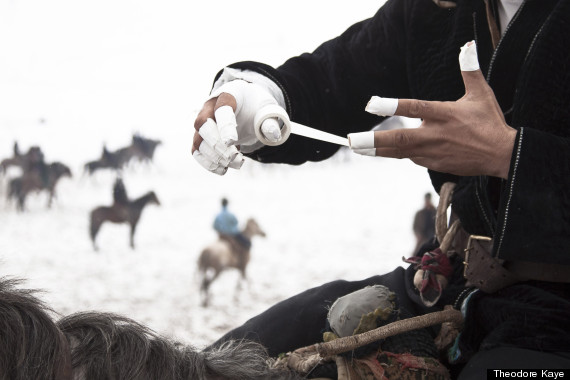
"The Other Hundred" is a unique photo book project aimed as a counterpoint to the Forbes 100 and other media rich lists by telling the stories of people around the world who are not rich but whose lives, struggles and achievements deserve to be celebrated. Its 100 photo stories move beyond the stereotypes and clichés that fill so much of the world's media to explore the lives of people whose aspirations and achievements are at least as noteworthy as any member of the world's richest 1 percent.
This project has a special meaning for me because for as long as I can remember, lists of the rich and famous have had a perverse hold on me. Populated with figures unlike anyone I had ever met with lifestyles the opposite of what I had always been taught was the right way to behave, they clearly could not be held up as models for emulation. And yet, with their wealth, power and influence, weren't they also meant to be models of success -- figures we should be looking up to? Clearly there was confusion here -- possibly even a contradiction. My conclusion was that rich lists were built around a lie. The reality is we can't all be rich. Most people on this planet can't even aspire to having even the tiniest fraction of wealth; 8 out of 10 live on U.S. $10 or less a day.
This is not something to celebrate, but nor should it have us despairing. Rather, it should tell us that if we want to look for success, then we should look elsewhere than those celebrations of excess epitomized by the Forbes' billionaires list and its many imitators. From this insight emerged the idea of "The Other Hundred": to turn the notion of a rich list on its head and celebrate instead not just those at the other end of society, but also the myriad ways in which people around the world use multiple means to gauge their own success and satisfaction -- some material, others not. Developing this idea took a while. I knew I didn't want to celebrate poverty. Being poor is a bad thing; everyone should have enough to satisfy his or her fundamental needs. But nor do people wake up with the dream of becoming millionaires; rather, people set about realizing more concrete, local tasks with the ideas and materials at hand.
One year later the end result of this musing was "The Other Hundred" (www.theotherhundred.com), the first book in what I now know will be a series -- a collection of 100 photo stories from 91 countries across six continents and selected from more than 12,000 images from 156 countries.
Many other ideas, themes and questions came up in the making of this book, and I hope it takes readers on a journey that helps them understand the world a little bit better. But the main goal remains to show the incredible variety of human life that exists in the world and which we almost never hear about. I would like to think that we succeeded.
We are currently working on the second edition of "The Other Hundred" for a December 2014 publication, focusing on the entrepreneurs left out of the mainstream media. These are the millions of people around the world who have ventured out and done things their own way without ever graduating with an Ivy League MBA, hiring an investment bank, planning an IPO or dreaming of fame and fortune.
Below is a series of photos capturing the story of one of these otherwise overlooked "Other Hundred."
Dushanbe, Tajikistan Photographer: Theodore Kaye
Khurshed and his three brothers live on the outskirts of Dushanbe, the capital of Tajikistan. Their family passion, stretching back at least three generations, is the Central Asian sport of buzkashi.
Played by Afghans, Uzbeks, Hazaras, Kazakhs, Kyrgyz, Turkmens and Pashtuns, as well as Tajiks, buzkashi has few rules. Up to a hundred or more riders fight to seize a headless goat carcass then carry it to a goal. In games that can last up to several hours, almost anything goes in this free-for-all sport.
As is common in the buzkashi world, rather than riding their own horses, the brothers ride a string owned by a wealthy individual. In their case, a businessman-banker.
During the off season, the brothers get by on side jobs. Khurshed sells cheap cell phones in a bazaar, and the family also does some farming. But their primary work involves caring for horses, for which their backer pays them a salary.
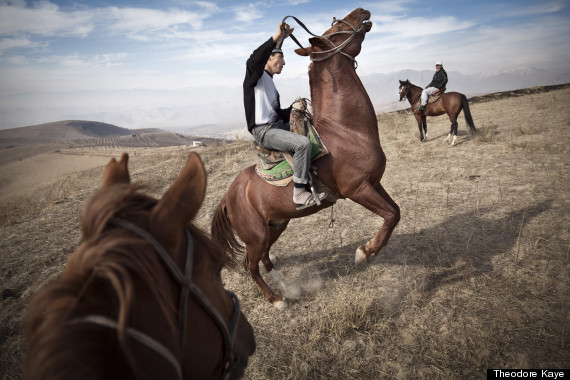 On the hills near his home, Suhrob exercises one of the brothers’ team of horses.
On the hills near his home, Suhrob exercises one of the brothers’ team of horses.
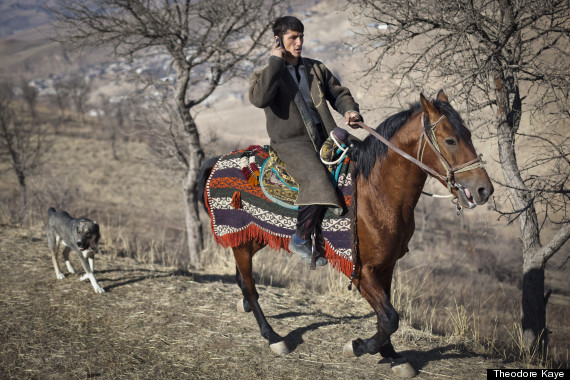
Ahliddin discusses the weekend’s buzkashi matches with a friend on his cellphone.
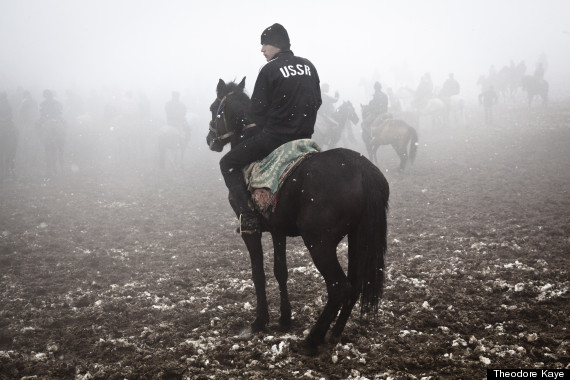 Rustam takes a break during a foggy buzkashi match.
Rustam takes a break during a foggy buzkashi match.
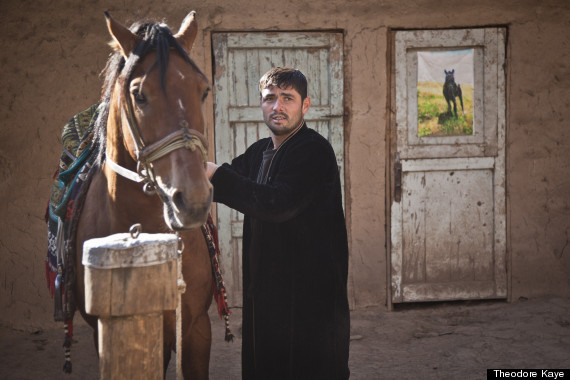
Khurshed prepares a horse for its daily exercises near his home on the outskirts of Dushanbe.
